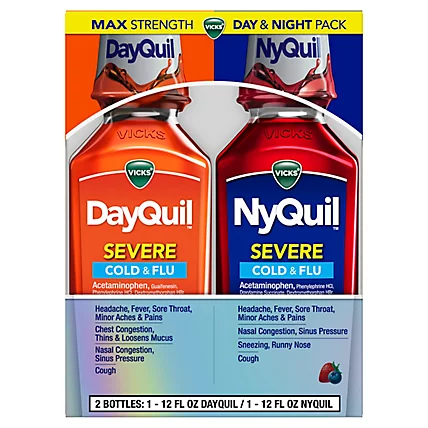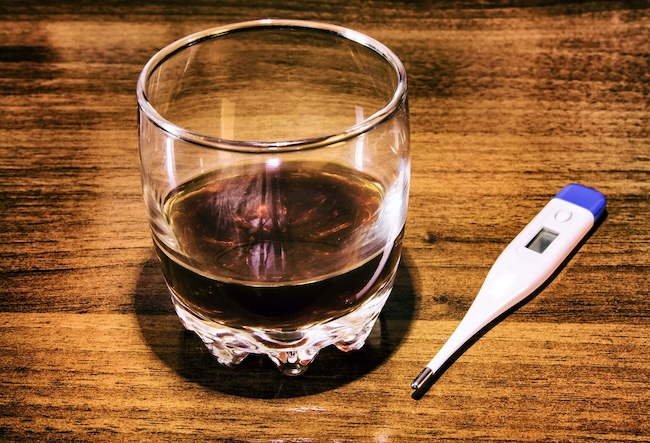
Combining NyQuil with alcohol can be dangerous due to the interactions between the medication’s ingredients and alcohol. This article will explain the specific risks, including amplified sedation and liver damage, and offer safer alternatives.
Key Takeaways
Mixing NyQuil and alcohol significantly amplifies sedative effects, increasing the risk of respiratory depression, impaired cognitive function, and severe health complications.
Chronic use of both substances can lead to serious liver damage, dependency, and an elevated risk of overdose.
Consulting a healthcare professional and exploring non-drug remedies is essential to avoid harmful interactions and manage cold symptoms safely.
Table of Contents
Understanding NyQuil and Alcohol Interactions
Understanding how NyQuil and alcohol interact is key to recognizing the associated risks. NyQuil, a common over-the-counter medication, contains ingredients designed to alleviate cold and flu symptoms. However, when mixed with alcohol, these ingredients can lead to serious health issues.
Alcohol consumption can amplify NyQuil’s effects, resulting in harmful interactions that could impact your health significantly.
What is NyQuil?
Before: NyQuil is an over-the-counter medication. It is widely used to relieve symptoms of the common cold and flu. It contains several active ingredients, including acetaminophen, which acts as a pain reliever and fever reducer; dextromethorphan, a cough suppressant; and doxylamine succinate, which relieves runny nose and sneezing and can induce drowsiness. These ingredients work together to provide comprehensive flu nighttime relief.
After: NyQuil is an over-the-counter medication widely used to relieve symptoms of the common cold and flu. It contains several active ingredients:
Acetaminophen, which acts as a pain reliever and fever reducer
Dextromethorphan, a cough suppressant
Doxylamine succinate, which relieves runny nose and sneezing and can induce drowsiness
These ingredients work together to provide comprehensive flu nighttime relief.
Interestingly, some NyQuil products contain up to 10% alcohol, while others are alcohol-free. The presence of alcohol in NyQuil helps to dissolve certain active ingredients, making them more effective. However, this alcohol content can pose additional risks when combined with alcoholic beverages.
Knowing how NyQuil’s ingredients affect your body is crucial. Acetaminophen, while effective in relieving pain and fever, can cause liver damage when taken in excessive amounts or combined with other substances that stress the liver, such as alcohol. Dextromethorphan, the cough suppressant, can cause dizziness and drowsiness, which are intensified when mixed with alcohol. Doxylamine succinate, an antihistamine, can cause significant drowsiness, making it unsafe to mix with alcohol.
NyQuil Ingredients and Their Functions
NyQuil is a popular over-the-counter medication used to relieve cold and flu symptoms. It contains a combination of active ingredients that work together to provide temporary relief from multiple symptoms simultaneously. Understanding the functions of each ingredient is crucial to using NyQuil safely and effectively.
Acetaminophen: Pain Reliever and Fever Reducer
Acetaminophen is a common pain reliever and fever reducer found in many over-the-counter medications, including NyQuil. It works by blocking the production of prostaglandins, which are chemicals in the body that cause pain and fever. Acetaminophen is generally considered safe when used as directed, but it can cause liver damage when taken in excess or combined with other substances, such as alcohol.
Dextromethorphan (DXM): Cough Suppressant
Dextromethorphan (DXM) is a cough suppressant that works by blocking the cough reflex in the brain. It is a common ingredient in many over-the-counter cough medications, including NyQuil. DXM is generally considered safe when used as directed, but it can cause respiratory depression when taken in excess or combined with other substances, such as alcohol.
It is essential to use NyQuil responsibly and follow the recommended dosage instructions to avoid adverse effects or interactions with other medications. Mixing NyQuil with alcohol can lead to serious health consequences, including liver damage, respiratory depression, and central nervous system depression. If you have any concerns about using NyQuil or mixing it with other substances, consult a healthcare professional for guidance.
How Alcohol Affects NyQuil
Both NyQuil and alcohol are sedatives, meaning they slow down brain activity and bodily functions. When you mix alcohol with NyQuil, the sedative effects of both substances are amplified, leading to dangerously increased sedation. This can result in extreme drowsiness, impaired coordination, and even hallucinations. The combination of these two substances can be particularly harmful because it significantly increases the risk of adverse reactions.
Alcohol interacts with the active ingredients in NyQuil, such as dextromethorphan and doxylamine succinate, enhancing their sedative effects. This can lead to severe cognitive impairment and increased risk of accidents. Additionally, the combination can depress the respiratory system, potentially leading to respiratory depression, which is life-threatening.
Furthermore, mixing NyQuil with alcohol can amplify effects like drunkenness and hallucinations due to the interaction between alcohol and dextromethorphan. Given these risks, it is strongly recommended to avoid consuming alcoholic beverages when taking NyQuil.
Recognizing how NyQuil and alcohol interact helps avoid potential harmful effects. Always read the labels of any over-the-counter medications and consult healthcare professionals if you are unsure about their interactions with alcohol.
Health Risks of Mixing NyQuil with Alcohol

Mixing NyQuil with alcohol can lead to a variety of severe health risks. The combined effects of these substances can result in detrimental impacts on your body, including serious liver complications, impaired cognitive function, and an increased risk of overdose.
These risks highlight the importance of understanding and avoiding the dangerous combination of NyQuil and alcohol.
Central Nervous System Depression
NyQuil and alcohol are both classified as central nervous system depressants. This means that they slow down brain activity and have an effect on bodily functions. When taken together, the sedative effects of these substances are dangerously enhanced, leading to significant central nervous system depression. This can result in excessive drowsiness, impaired cognitive function, and slowed or shallow breathing, which can be life-threatening.
The combination of alcohol and NyQuil can lead to severe respiratory depression, characterized by dangerously slowed or shallow breathing. This risk is particularly high in individuals who already have underlying respiratory conditions. Additionally, the heightened sedation can impair your cognitive abilities and increase the risk of accidents and injuries.
Liver Damage
Chronic alcohol consumption, in conjunction with acetaminophen (a key ingredient in NyQuil), significantly increases the risk of liver damage. This combination can lead to severe liver conditions, such as fatty liver disease and cirrhosis. The liver is responsible for metabolizing both alcohol and acetaminophen, and the combined stress from these substances can overwhelm its capacity, leading to serious liver damage over time.
Regularly mixing NyQuil with alcohol can result in acute liver failure due to acetaminophen toxicity. The risk is even higher for individuals who drink alcohol heavily, as their livers are already under significant strain. Being aware of these risks helps prevent long-term liver damage.
Increased Risk of Overdose
Combining NyQuil and alcohol increases the risk of overdose due to their combined effects on the body. The 10% alcohol content in liquid NyQuil can significantly raise the overall alcohol level in your system, increasing the likelihood of overdose. Both substances can depress the respiratory system, leading to severe complications such as respiratory depression.
If you experience unusual symptoms after mixing NyQuil and alcohol, it is essential to seek immediate medical treatment. Difficulty refraining from mixing these substances may indicate a deeper issue with substance use, and seeking professional help is crucial.
Short-Term Effects of Mixing NyQuil and Alcohol
Mixing NyQuil and alcohol can lead to a range of short-term effects that should not be overlooked. These immediate consequences include impaired judgment and coordination, excessive drowsiness, and respiratory depression.
Recognizing these effects helps prevent accidents and ensures safety.
Impaired Judgment and Coordination
The combination of NyQuil and alcohol impairs judgment and coordination, significantly increasing the risk of accidents. Both substances enhance sedation and drowsiness, which can lead to impaired cognitive function and coordination. This heightened drowsiness can result in accidents and injuries, especially if you are operating machinery or driving.
Taking higher doses of dextromethorphan with alcohol can create a sensation of being drunk, further impairing judgment and increasing the risk of dangerous behaviors.
Excessive Drowsiness
The sedative effects of NyQuil and alcohol can lead to extreme drowsiness that lasts for several hours. NyQuil contains doxylamine succinate, an antihistamine that causes significant drowsiness and amplifies alcohol’s sedative effects. This excessive drowsiness poses substantial safety risks, such as impaired coordination and an increased likelihood of accidents.
Respiratory Depression
Mixing NyQuil with alcohol increases the risk of respiratory depression, which can be life-threatening. This serious condition involves dangerously slowed or shallow breathing.
Individuals with underlying respiratory conditions are particularly affected by this combination, making it crucial to avoid mixing these substances.

The long-term consequences of mixing NyQuil and alcohol can be severe and far-reaching. Chronic use of these substances together can lead to serious health issues, including liver damage and dependency. Being aware of these long-term risks is essential for maintaining health and avoiding severe consequences.
Chronic Liver Disease
Continuous mixing of NyQuil and alcohol poses significant risks for chronic liver disease, primarily due to their combined negative effects on liver health. Conditions such as fatty liver disease and cirrhosis can develop from chronic exposure to these substances.
The long-term consequences include not only severe liver damage but also compromised overall health, affecting various organs and systems.
Dependency and Addiction
Mixing alcohol and NyQuil can lead to addiction, especially when used frequently. NyQuil can lead to dependency when taken at high doses, and regular mixing with alcohol increases the risk of developing dependency on both substances.
Young adults and teens are particularly at risk for cough medicine addiction, making it crucial to address this issue early on.
Safer Alternatives and Precautions
Considering safer alternatives and taking necessary precautions can help avoid the risks of mixing NyQuil and alcohol. Speaking with a healthcare professional is a key step in this process.
There are also effective non-drug methods for symptom relief and safe use of sleep aids that can help you avoid harmful interactions.
Consulting a Healthcare Professional
Healthcare professionals play a vital role in ensuring the safe use of medications and understanding their interactions with alcohol. They can provide insights into any potential risks and offer guidance on safer alternatives. Always read medication labels carefully and consult a healthcare professional before mixing with alcohol to avoid harmful interactions.
Letting your healthcare provider know about all your medications helps prevent adverse effects. If you routinely mix medications with alcohol, seeking professional help can help you understand and change these behaviors. Healthcare professionals can also assist in exploring suitable treatment options for alcohol dependency.
Non-Drug Methods for Symptom Relief
There are effective non-drug methods to relieve cold and flu symptoms without the risks associated with mixing medications and alcohol. Hydration, rest, and humidified air can alleviate symptoms and promote recovery. These methods are safe and can be used in conjunction with other treatments to provide relief.
Staying hydrated helps thin mucus and ease congestion, while rest allows your body to heal. Humidified air can soothe irritated airways and reduce coughing.
Simple, non-drug methods can effectively manage cold and flu symptoms, reducing reliance on over-the-counter medications.
Safe Use of Sleep Aids
For those struggling with sleep issues, non-alcoholic sleep aids are available and can be a safer alternative to NyQuil. It is important to find sleep aids that do not interact with alcohol to avoid the risks associated with mixing sedative substances.
Following the recommended dosage and avoiding alcohol is essential when using any sleep aid. Non-alcoholic sleep aids can help you achieve restful sleep without the heightened drowsiness and safety risks associated with combining NyQuil and alcohol.
Always consult a healthcare professional for advice on safe sleep aids and appropriate use.
Seeking Help for Alcohol Use Disorder
If you find yourself regularly mixing NyQuil with alcohol, it may be a sign of a deeper issue with alcohol use disorder. Recognizing the signs of dependency and seeking help is crucial for your health and well-being.
The combination of NyQuil and alcohol can create a cycle of nyquil and alcohol addiction, especially when used as a coping mechanism.
Recognizing Signs of Alcohol Abuse
Identifying signs of alcohol abuse is the first step toward recovery. Indicators of alcohol dependency include an inability to limit consuming alcohol despite negative consequences, neglecting responsibilities, and experiencing withdrawal symptoms when not drinking. Early recognition and intervention can significantly improve outcomes.
Seeking professional help is vital for addressing alcohol addiction. Healthcare professionals can provide guidance, expertise, and resources to support your recovery journey. If you notice signs of alcohol abuse in yourself or a loved one, it’s important to seek help immediately.
Finding Support and Treatment Options
Alcohol use disorder is a serious condition that requires professional treatment and support. Recognizing the signs of alcohol abuse, such as cravings, loss of control, and neglect of responsibilities, is crucial for early intervention. Various support systems, including counseling, support groups, and rehabilitation programs, offer treatments for addiction.
Professional help is essential for managing alcohol use disorder effectively. These support systems provide the necessary tools and resources to help individuals overcome addiction and improve their quality of life. If you or someone you know is struggling with alcohol use disorder, seeking professional help can make a significant difference.
Importance of Professional Help
Identifying alcohol use disorder and seeking professional help are crucial for recovery. Early detection and intervention can dramatically improve outcomes. Common signs of alcohol abuse, such as increased drinking, neglecting responsibilities, and withdrawal symptoms, highlight the need for professional assistance.
Various support systems, including counseling, rehabilitation programs, and support groups, are available to help individuals struggling with alcohol use disorder. Professional help provides the necessary support and resources to manage and overcome addiction.
If you’re dealing with drinking alcohol dependency, reaching out for professional help is a critical step towards recovery.
Summary
Mixing NyQuil with alcohol poses significant health risks, including central nervous system depression, liver damage, and an increased risk of overdose. Understanding these risks and avoiding the dangerous combination of these substances is crucial for your health and safety. If you find yourself struggling with alcohol use disorder, recognizing the signs and seeking professional help can significantly improve your quality of life. Always prioritize your well-being and consult healthcare professionals for advice on safe medication use and effective treatments for addiction.
Frequently Asked Questions
Why is it dangerous to mix NyQuil and alcohol?
Mixing NyQuil and alcohol is dangerous because it intensifies sedation, which can lead to respiratory depression and liver damage. It’s crucial to avoid this combination to protect your health.
What should I do if I accidentally mix NyQuil and alcohol?
If you accidentally mix NyQuil and alcohol, stop consuming alcohol right away and seek medical attention if you experience any negative symptoms. Your safety is the priority.
Are there safer alternatives to NyQuil for symptom relief?
Yes, alternatives such as hydration, rest, and using humidified air can effectively relieve cold and flu symptoms without medication. Consider these safer options for symptom management.
How can I recognize signs of alcohol abuse?
You can recognize signs of alcohol abuse by observing an inability to control drinking, neglect of responsibilities, and withdrawal symptoms. Addressing these signs early is crucial for effective intervention.
What support options are available for alcohol use disorder?
Counseling, support groups, and rehabilitation programs are key support options available for alcohol use disorder, offering comprehensive treatment for recovery. It’s essential to explore these resources to find the right path to healing.
Dr. Mitchell G. Cohen is a board-certified Internal Medicine specialist with over 34 years of experience in patient-centered healthcare. A graduate of Hahnemann University School of Medicine, Dr. Cohen completed his internship at the University Health Center of Pittsburgh, where he gained invaluable hands-on experience. He is also a certified addiction specialist, holding membership with the American Society of Addiction Medicine (ASAM).
Currently based in Nashua, NH, Dr. Cohen is affiliated with Saint Joseph Hospital, where he provides comprehensive care focusing on both internal medicine and addiction treatment. His expertise includes prevention, diagnosis, and management of adult diseases, as well as specialized care for individuals facing substance use disorders.
Dr. Cohen is committed to fostering open communication, ensuring his patients are fully informed and empowered to make confident decisions about their health and treatment options.

MD Mitchell Grant Cohen
Dr. Mitchell G. Cohen is a board-certified Internal Medicine specialist with over 34 years of experience in patient-centered healthcare. A graduate of Hahnemann University School of Medicine, Dr. Cohen completed his internship at the University Health Center of Pittsburgh, where he gained invaluable hands-on experience. He is also a certified addiction specialist, holding membership with the American Society of Addiction Medicine (ASAM).
Currently based in Nashua, NH, Dr. Cohen is affiliated with Saint Joseph Hospital, where he provides comprehensive care focusing on both internal medicine and addiction treatment. His expertise includes prevention, diagnosis, and management of adult diseases, as well as specialized care for individuals facing substance use disorders.
Dr. Cohen is committed to fostering open communication, ensuring his patients are fully informed and empowered to make confident decisions about their health and treatment options.
- MD Mitchell Grant Cohen
- MD Mitchell Grant Cohen
- MD Mitchell Grant Cohen
- MD Mitchell Grant Cohen
- MD Mitchell Grant Cohen
- MD Mitchell Grant Cohen
- MD Mitchell Grant Cohen
- MD Mitchell Grant Cohen
- MD Mitchell Grant Cohen
- MD Mitchell Grant Cohen
- MD Mitchell Grant Cohen
- MD Mitchell Grant Cohen
- MD Mitchell Grant Cohen
- MD Mitchell Grant Cohen
- MD Mitchell Grant Cohen
- MD Mitchell Grant Cohen
- MD Mitchell Grant Cohen
- MD Mitchell Grant Cohen
- MD Mitchell Grant Cohen
- MD Mitchell Grant Cohen
- MD Mitchell Grant Cohen
- MD Mitchell Grant Cohen
- MD Mitchell Grant Cohen
- MD Mitchell Grant Cohen
- MD Mitchell Grant Cohen
- MD Mitchell Grant Cohen
- MD Mitchell Grant Cohen
- MD Mitchell Grant Cohen
- MD Mitchell Grant Cohen
- MD Mitchell Grant Cohen
- MD Mitchell Grant Cohen
- MD Mitchell Grant Cohen
- MD Mitchell Grant Cohen
- MD Mitchell Grant Cohen
- MD Mitchell Grant Cohen
- MD Mitchell Grant Cohen
- MD Mitchell Grant Cohen
- MD Mitchell Grant Cohen
- MD Mitchell Grant Cohen
- MD Mitchell Grant Cohen
- MD Mitchell Grant Cohen
- MD Mitchell Grant Cohen
- MD Mitchell Grant Cohen
- MD Mitchell Grant Cohen
- MD Mitchell Grant Cohen
- MD Mitchell Grant Cohen
- MD Mitchell Grant Cohen
- MD Mitchell Grant Cohen
- MD Mitchell Grant Cohen
- MD Mitchell Grant Cohen
- MD Mitchell Grant Cohen
- MD Mitchell Grant Cohen
- MD Mitchell Grant Cohen
- MD Mitchell Grant Cohen
- MD Mitchell Grant Cohen
- MD Mitchell Grant Cohen
- MD Mitchell Grant Cohen
- MD Mitchell Grant Cohen
- MD Mitchell Grant Cohen
- MD Mitchell Grant Cohen
- MD Mitchell Grant Cohen
- MD Mitchell Grant Cohen
- MD Mitchell Grant Cohen
- MD Mitchell Grant Cohen
- MD Mitchell Grant Cohen
- MD Mitchell Grant Cohen
- MD Mitchell Grant Cohen
- MD Mitchell Grant Cohen
- MD Mitchell Grant Cohen
- MD Mitchell Grant Cohen
- MD Mitchell Grant Cohen
- MD Mitchell Grant Cohen
- MD Mitchell Grant Cohen
- MD Mitchell Grant Cohen
- MD Mitchell Grant Cohen
- MD Mitchell Grant Cohen
- MD Mitchell Grant Cohen
- MD Mitchell Grant Cohen
- MD Mitchell Grant Cohen






